As automotive technology continues to amaze us today, we sometimes forget about the cars of yesterday that got us here. In the early days of motoring, there were dozens of different automobile manufacturers spread across the country. Each one of them wanted to produce the most popular automobile. However, it was Henry Ford and his Model T that put America on the road. This 1924 Ford Model T, found for us on craigslist by the unstoppable Rocco B., is currently looking for a caretaker. While it hasn’t been driven in two years, this Columbia City, Indiana Model T has been stored in a climate controlled garage and is almost all original. Would you be a buyer at $6850?
While my Ford love ranges from Model As to prewar Flatheads, I still would love to have a Model T. An old friend of mine has a barn full of restored ones and has offered me a chance to drive one whenever I get down his way again. I also camped next to a couple that had an unrestored one that they used as a runabout at the swap meet we were visiting. The little T coupe cranked right up every morning, and they drove it quite briskly wherever they went. Seeing one motoring around is like being a kid who eyes a new toy. That neat feeling just overwhelms you.
As we look around this Model T we see that most everything is there and in useable condition. The spare tire is missing, as is the headliner. Yet the rest of the body seems to back up the original interior and chassis claims. The seller also claims that the car was painted 40-45 years ago. Almost certainly it was painted in lacquer. After 45 years in lacquer, cracks and “patina” make the paint look as if Ford applied it as well.
The claim that the interior is original is pretty believable. It appears the moths have held their annual convention in the confines of this T. Fortunately, there is enough there to give us a good idea what a T looked like inside when it sat in the showroom. We can also see the trademark three pedals and the neat wooden steering wheel. If it were mine, I would install a headliner, and put covers on the seats. While rough, it is still nice to see a car this age with the original interior.
Under the hood seems to be a display of additions to a stock Model T engine. The pulley system is very interesting, with a power take off that looks like it is connected to the horn. Going back to the pulleys and belt, I am pretty sure Ol’ Henry hadn’t come up with a grooved serpentine belt system by 1924. If anyone has any information about this apparatus, please enlighten us. I’ve never even heard of a setup like this.
The passenger side of the engine reveals a generator and more of that funky belt system. The plug wires have been disconnected, and the rest of the engine looks pretty well untouched from when it came off the assembly line. The carburetor is nestled near the bottom of the block in a position contrary to current practice.
It seems a shame that this car is looking for a home 94 years after it was built. Caring for such a car is both a privilege and a pain. Its a privilege because cars like this are a window into who we were as a nation in the 1920s. It was designed for the narrow, muddy roads that connected America’s cities and towns, and was built to be rugged but easy to work on. The fact that so many of these cars have lasted so long is a testament to the quality materials Henry Ford insisted on. The pain of owning such a car is its impracticality in the modern world. Roads were a lot less traveled back in the day, and speeds were nowhere near those we are accustomed to now. A Model T requires patience from both the driver and fellow travelers. There is not a lot of that to go around anymore.
Still, a Model T should be on everyone’s bucket list. No car was more influential in the history of America. While there were cars before, nearly all were expensive and unreliable. We won’t even mention the parts and service situation. Ford’s standardization of the design and constant improvement of it over the years made the Model T the logical choice for a family’s first car. It is the car that made us an automobile loving nation, and this one is a good example of the breed. Hopefully one of you finds it in your heart to be its new caretaker.

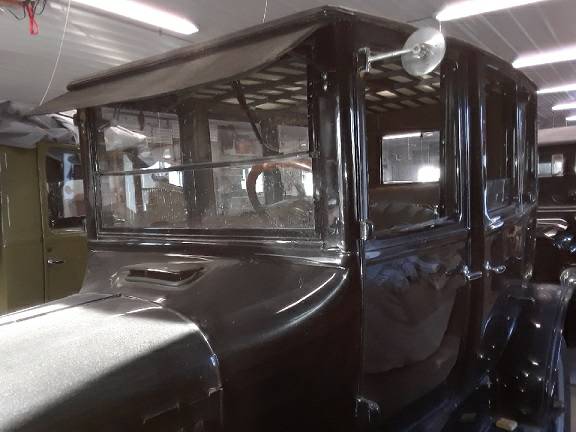
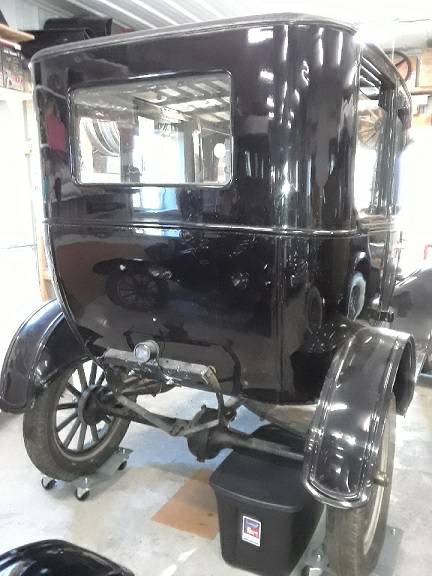
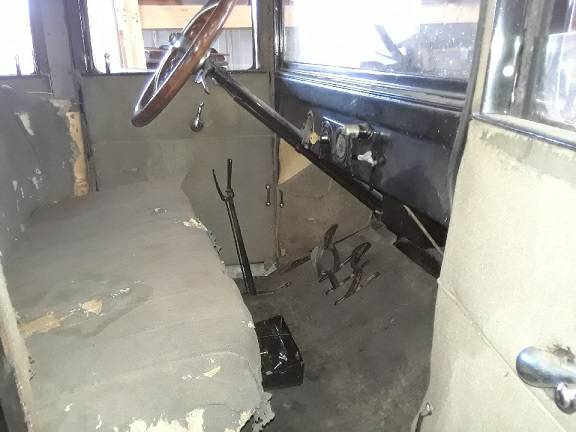
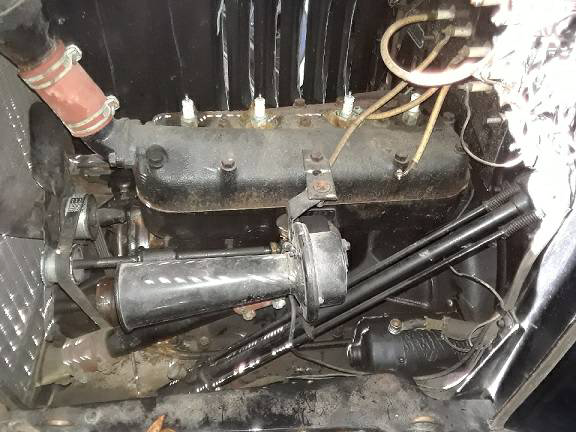
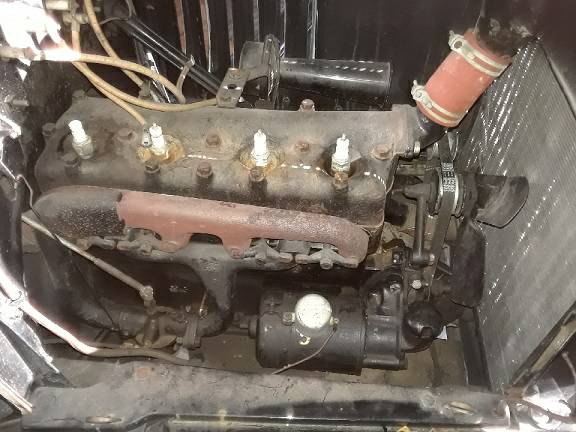


Brother has 26 coupe,mechanically perfect,interior rough but original, exterior looks its age. Tried to get him to hammer and dolly the dents out of the fenders but he likes the look.Thought I was quite the gear jammer till I got behind the wheel. Once around the section with him as co-pilot helped some. I find T’s interesting from a historical perspective,but as Jeff said, takes quite a commitment to own one.
Impractical is very true, I had a 1919 Chevy that looks identical but shifts normally, and despite that found it totally impractical. It’s a shame, because so many of these T’s were saved. In a few years, there may not be enough willing garages to hold them.
Your Chevy was nothing like the Model T altough they do look vaguely similar. There was at least 5 years of development between your Chevy and the T. Chevy even had a V8 by 1919. I’ll assume you had a 490 which had an overhead valve 4. The Chevy was a lot more expensive than the Model T. A well restored 1919 Chevy can be somewhat practical as long as it’s not raining and you stay off the freeways. A fellow at the museum (Milt, AKA Dr. T) drives his stock T on the Freeway and used to drive it cross country to Model T gatherings. He often drives his T up from Elk Grove up to Sacramento.
That chevrolet V8 you’re referring to, was a short lived flop built from 1917-1918, and few were sold. Not a whole lot to brag about.
I like because it is a 4-door, and it would be fun to have as a piece of history. But, I am sure like most of us, I don’t have the space or money to buy a museum piece.
These cars would run on kerosene , gas etc and durable 👍
Henry actually bought em up and destroyed many of them so consumers bought A models
The pulley system power’s an aftermarket water pump. The car did not have one when new. They’re usually installed when the radiator stops working effectively. I have known cases where the pump actually makes the overheating gets worse due to the pump becoming a blockage.
I did not know they were after market. I have seen a couple variations of water pumps on T’s. Being after market would explain the differences.
I too am guilty of not having the room or more importantly the means to maintain this T. Hats off to you for such a wonderful description. Makes any normal American proud
The belt is driving a water pump. Not original but a common accessory. The horn is bolted to the water pump.
I got into Model T’s in 2000 when I bought a 21 basket case. My first antique. It took 18 months to restore it. I have since put 17000 plus miles on it. Since I retired I spend a couple of days a week volunteering repairing Model T’s and A’s at the Henry Ford Museum in Dearborn Michigan. They have a fleet of 14 Model T’s and 11 Model A’s that are used 9 months a year. The A’s are mostly trucks. The T’s are the touring cars and Depot Hacks. With one T wrecker. The touring cars average 10,000 miles a year giving guests rides in Greenfield Village.
That ‘funky’ belt system is actually an aftermarket water pump. It does not go to the horn…lol. Very common upgrade.
T’s can be driven quite comfortably on modern roads. A well tuned car can easily maintain 40 MPH. You just have to be careful. Without aftermarket brakes stopping can be an issue. Especially on down hills.
Judging by the reflection at the rear I see the seller has another Model T lurking in the back of this one. Nice.
Let’s buy this and shove a big block Chevy in it as half breed cars are fun.
Channel and chop baby 👶🙀
Psyche just kidding if you were enraged then buy it and be a Stewart of the fine great great great grandpa car!
Oh, to have the space in the garage for this Tall-T Fordor and a Fronty cylinder head…
I love it but sadly cannot afford it.
That belt is for the aftermarket water pump. Model T’s did not leave the factory with one. Henry didn’t like them.. I do not run a pump on any of my T’s . Not because I’m a purist, I’m not. I just don’t like their leaky nature. The thermo siphon system works well.
The pulley you see undoubtedly drives an accessory water pump, mounted to the water inlet which is behind the horn in your photo. Model T’s had the Ford Thermosyphon system – no water pump, just thermal convection leading hot water out the top front of the head into the top of the radiator. The water cooled and flowed to the bottom of the radiator and thence to the water inlet on the left side of the engine. Some people added aftermarket water pumps, which most commonly mounted to the water inlet on the side of the engine as seen here. My 1916 Model T Touring car has an original-style round-tube brass radiator and still cools just fine without a water pump.
Wonderful car, great price, have the funds but nowhere to house this beauty.
This looks like a fair price, but no title could be an issue. I’ve driven several T’s, and they are fun for sure, but not suited to today’s roads / speeds / braking requirements / distracted drivers. If you live in the country, this is fun transportation.
Model T’s spawned a robust aftermarket for auto parts. People loved to customize their T’s!
I read that the earliest car that a modern driver could easily operate (if they could use a clutch) was a 1915 Cadillac.
Amen on distracted drivers and many many more factors. In 1969 I could drive the Model T anywhere and have no real issues. Brakes are poor (one band in the transmission, working on the rear brakes only), no stop or turn signals, etc. People then were more accustomed to older cars on the roads.
They understood hand signals, generally didn’t drive like maniacs, looked at least somewhat carefully before pulling out, etc., etc.
If you haven’t experienced that sort of thing and live in a suburban area, please at least go for a ride with someone before deciding this is an ideal summer car. In the city? Just forget using it other than for parades. My little town is as frightening as I want to get – driving 25 miles out to store the car in my hangar (all through outlying west Chicago suburbs) is a nerve wracking chore. I’m very comfortable driving the car itself (had it for nearly 50 years now) but today’s drivers scare me to no end with their carelessness, stupidity, and “me first” attitudes.
The model T motor was converted to OHV and used in midget speedway racing cars Not very sucessful
The car is certainly priced reasonably, but I’d still have to negotiate quite a bit. ‘ Could find a place for it in my shop, and I’d love to own one. My dad drove one on a rural mail route in Renville Minnesota – for my mailman-grandpa, who could not drive. He’d get behind the wheel and say “giddap”. My dad was in high school back then – circa 1920. He never got to school before 10 AM all the way through high school. He was full of stories regaling Model Ts: there was absolutely nothing else on the road that could take the abuses a T would take in stride. But even new, they burned a quart of oil every 25 miles. My dad taught me to wrap your thumb WITH your fingers when cranking. I still need to use that advice! (Except on my ’59 Morris Minor back quite a few years ago…).
Thanks Jeff Bennett, for a heart-warming essay on the evolving human condition. It’s a touching stand-alone piece – beyond describing the car.
A good Model T engine will use some oil, yes. But now 25 mpq. It is usually a couple of hundred miles per quart.
Ran out of editing time. Read https://www.newyorker.com/magazine/1936/05/16/farewell-my-lovely for an affectionate look back on the Model T – published in 1936! Written by E B White, of “Charlotte’s Web” fame.
Coyote it!!!! That’ll get it moving!!! LOL
Thanks for the link Allen, great article. I hope to get to ride in a Model T one day.
Just come to Greenfield Village in Dearborn Michigan.
Collectors but and sell these original tall boys for really high dollars. Apparently they are worth it. Even,thoigh the body looks really good and the interior needs a lot of work, I have never had this kind of money. More power to the new owner. Good luck and God bless.
It will probably cost a lot to fix the interior. There is a lot of wood holding things together. A wood kit alone could run you $6000. And yes you can buy it. You can’t for any other car of that age. Almost all car bodies of that age is just sheet metal tacked to wood. I would still love to have it.
I agree that the price is within reason. The first 500 or so Model T’s (1909) came with water pumps. The following 15,000,000+ didn’t, because it wasn’t needed. The presence of an aftermarket water pump is often an attempt to overcome a defunct radiator.